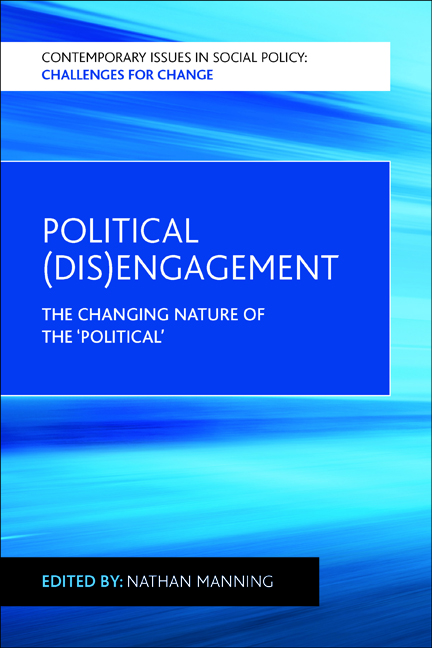five - Feeling politics: the importance of emotions for understanding electoral (dis)engagement
Published online by Cambridge University Press: 11 March 2022
Summary
Introduction
A range of emotions are routinely invoked and represented in public discussions of politics. Recent examples abound: President Obama's 2008 campaign motif of ‘hope’; the outpouring of anger and indignation expressed through the Occupy movement in many countries across the world (for example, Langman, 2013); the joy and excitement in Egypt as Mubarak was overthrown (Ali, 2011); anger at Tony Blair from families of British military personnel killed during the Iraq war (Lewis and Dodd, 2010); the shame evoked by President Bush's response to hurricane Katrina (Cornwell, 2010); the catharsis as Australia's prime minister formally apologised to Australia's indigenous peoples. In addition, there is also a body of academic literature that documents widespread electoral disengagement, low levels of trust and high levels of cynicism about politics and politicians (Dalton, 2004; Stoker, 2006; Hay, 2007; Fox, 2012). Thus, popular connections are made between emotions and politics, and surveys frequently point to citizens’ dissatisfaction with politics; but social science, and sociology in particular, seldom considers the role and importance of emotions for electoral politics.
This chapter seeks to highlight the importance of emotions and feelings for understanding electoral (dis)engagement. Social research and analysis has long ignored the role that emotions may play in electoral politics, but recent work highlights the value of an emotionally attuned approach. Moreover, the decline of class as an organising framework for politics means that emotions may play an increasingly important role in citizens’ (dis)engagement with electoral politics. The displacement of class means that as people rely less on habitual behaviour or social structure to guide action emotional reflexivity (Holmes, 2010) becomes more important in deliberating and negotiating politics. The emotional turn in politics emerges out of the infectious egalitarianism of mass democracy and manifests itself in an expectation that politicians should present themselves as connected to ‘ordinary people’ and everyday life. Affinity – and lack of it – is thus a major way of engaging with the polis in an increasingly complex world (see Manning and Holmes, 2014 for a detailed discussion). While high levels of dissatisfaction and electoral disengagement have been registered, many people do still engage with politics, if not through voting.
- Type
- Chapter
- Information
- Political (Dis)EngagementThe Changing Nature of the 'Political', pp. 107 - 130Publisher: Bristol University PressPrint publication year: 2015



